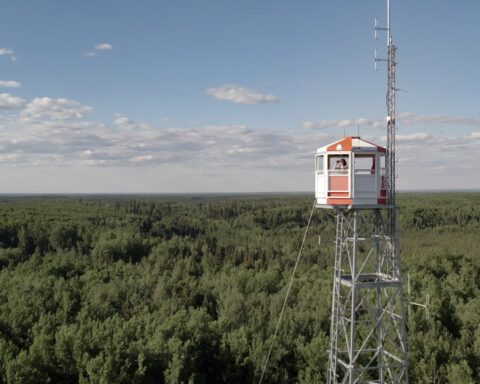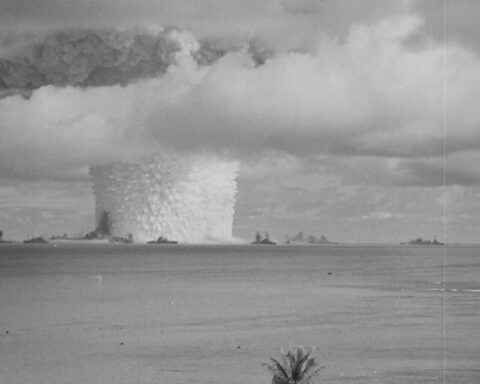“Blood is the Life” is the kind of line you would expect to see in a vampire flick, not a documentary that focuses its time on geologists, scientists and energy experts. And yet that is precisely how A Crude Awakening: The Oil Crash begins. In fact, the first lines of the film are “Oil is the excrement of the devil, Oil is black blood, Oil is the blood of the dinosaurs, Oil is the bloodstream of the global economy and Oil is the blood of the earth.”
It makes a certain kind of sense—albeit of an eerie if not downright disquieting kind. Oil, after all, is viscous; it is an energy dense substance that flows not unlike blood. And like blood, its absence or even a shortage of it, can very quickly become a major societal concern. It’s something Ontarians were sharply reminded of at the end of February this year, after a massive refinery fire created skyrocketing gasoline prices and empty gas stations throughout the province.
Clearly, Basil Gelpke’s and Ray McCormack’s documentary couldn’t be more topical. In A Crude Awakening, they tell the story about what the geoscientists and energy experts in the film call “Peak Oil.” The film describes the looming peak and decline in global oil production, arising out of ineradicable geological data. A Crude Awakening’s facts about oil were cooked up in nature’s version of hell’s kitchen and literally set in stone nearly 100 million years ago in sedimentary basins around the world. In a word, they are non-renewable. Or as the Mayor of the formerly booming oil town of McCamey, Texas more prosaically puts it, “they aren’t making any more dinosaurs.”
According to Gelpke and McCormack their goal with A Crude Awakening was to allow an audience with little or no knowledge of the subject to emerge from the theatre well versed in the basic geological concepts as they relate to oil production and its imminent decline. More importantly they wanted their audience to connect these dry facts (pun intended) with the myriad of social, economic, political and martial implications that are likely to occur on a planet whose oil supply is declining year after year ad infinitum and definitely with a certain amount of ad nauseum.
Still, Gelpke and McCormack were well aware that they were making a movie, albeit a nonfiction one. So, while a bust town is anything but funny, the backdrop to Texan Mayor Phillips as she speaks her sad words about the lack of dead dinosaurs is a rusted-up oil pumper that looks straight out of Jurassic Park. It is chuckle worthy, but the levity does not last long as her speech is followed by shots of the ecological, economic and social devastation suffered by the formerly booming oil fields and towns in Maracaibo, Venezuela and Baku, Azerbaijan.
For A Crude Awakening, the filmmakers interviewed 27 subjects, shot at over 50 locations on four continents and spent, in their own words, “on the wrong side of half a million dollars.” The film has now appeared in 32 festivals around the world, including Hot Docs, winning numerous awards including “Best of the Fest” in the Renoe/Tahoe Festival. It is stylish and at times even beautiful, but all of its craftiness pales next to its angst generating and thought-provoking message: that the age of energy scarcity is all but upon us.
Like all fine documentaries, A Crude Awakening is the story not just of its subject, but also of its filmmakers. Basil Gelpke is a journalist and TV documentarian who has made a substantial name for himself in Europe. He says that the film “is the most important thing I’ve ever done professionally.” Gelpke started his career in Swiss television and moved on, while still quite young, to become the Paris correspondent for The European Business Channel. Following that, he produced the TV show Tacheles and then became involved in setting up Germany’s first 24-hour TV news station. Afterwards, Gelpke returned to Switzerland where he participated in starting up NZZ Television, which is the TV department of Switzerland’s oldest and most respected newspaper Neue Zürcher Zeitung. There he shot dozens of TV documentaries, mostly dealing with science, economics, medicine and technology.
McCormack’s bio is more corporate: “…since 1996 he has produced commercials and films for many of the world’s leading advertising agencies and their clients, including Audi, Ford, Nestle, Pepsi and Mercedes.” (At one point, the man must have loved cars!) He also worked for Fugitive TV, Paul McCartney and Queen. Something happened to him, though, because “McCormack took time out from film production to gain a degree in Environmental Policy.” Gelpke brought him into the project, an indication that the two are in synch, politically and cinematically.
Clearly, what inspired McCormack and Gelpke to make A Crude Awakening was a sense of crisis regarding the world’s diminishing oil supply. After all, the stuff’s finite. But no less doubtful than this self-evident truth is that, as with global warming, most of us figured that this was not really going to be a problem for a good generation or two. Many of us thought that the oil crisis was what Douglas Adams called an SEP: Somebody Else’s Problem. But if the scientists and geologists and various energy experts in Gelpke’s and McCormack’s film are to be believed, it seems more likely that the problem is more here and now than there and then.
One of the few things this film doesn’t explore about oil is how the frantic scramble to replace this dwindling source of energy is more likely to increase than decrease CO2 emissions, thereby exacerbating climate change. Like Gelpke, McCormack is very aware and concerned about the issue of global warming and mused out loud, in an interview conducted for POV, about whether it would be possible, “to make the ultimate global warming film like we’ve made the ultimate peak oil film.” In the time since we talked, Al Gore has proven both that this can be done and that Mr. McCormack will not be the one doing it. Recognizing this himself he recently wryly said of his own film, “the only thing that’s missing is Al Gore.”
It’s clear that A Crude Awakening brings its own strengths to the genre of environmental docs and that the truth that Gelpke and McCormack uncover is just as “inconvenient” as Mr. Gore’s. The public that has embraced Gore’s Oscar-winning film about emissions should very definitely see this one about energy: for as any scientist will tell you they are but two sides of the same coin. It’s a coin with which we can no longer afford to be spendthrift if we plan to leave an inheritance.
Chronology of the Peak Oil Theory
Peak oil theory was proposed by the preeminent oil geologist of the 20th century, American geophysicist Dr. M. King Hubbert. His insight was simple: the oil production curve must inevitably follow the oil discovery curve. Or as they say in the oil industry,“You can’t pump what you haven’t found.”
Hubbert’s research showed that oil discovery in the U.S. had peaked in the 1930s and his theory projected from the data that oil production would do the same, sometime around 1970. The good doctor revealed this theory in 1956 in a paper as widely circulated as it was dismissed. Nonetheless, right on cue, in December 1970 the U.S. hit a record of 10.2 million barrels a day that it has never matched since. U.S. production today is around 5 million barrels a day.
The work of the geo-scientists carrying on Hubbert’s work today can be read by at peakoil.net, the site for ASPO (The Association for the Study of Peak Oil and Gas). Their most recent estimates are that global oil production will peak some time between today and 2015.
Post Carbon Groups
Julian Darley founded the Post Carbon Institute (PCI) in Vancouver in 2003. One of PCI’s initiatives was to encourage the start-up of ‘Post Carbon Outposts,’ groups that seek to raise awareness about the issue of energy security. To date there are 148 groups in 12 countries. For more information, check out their website.










